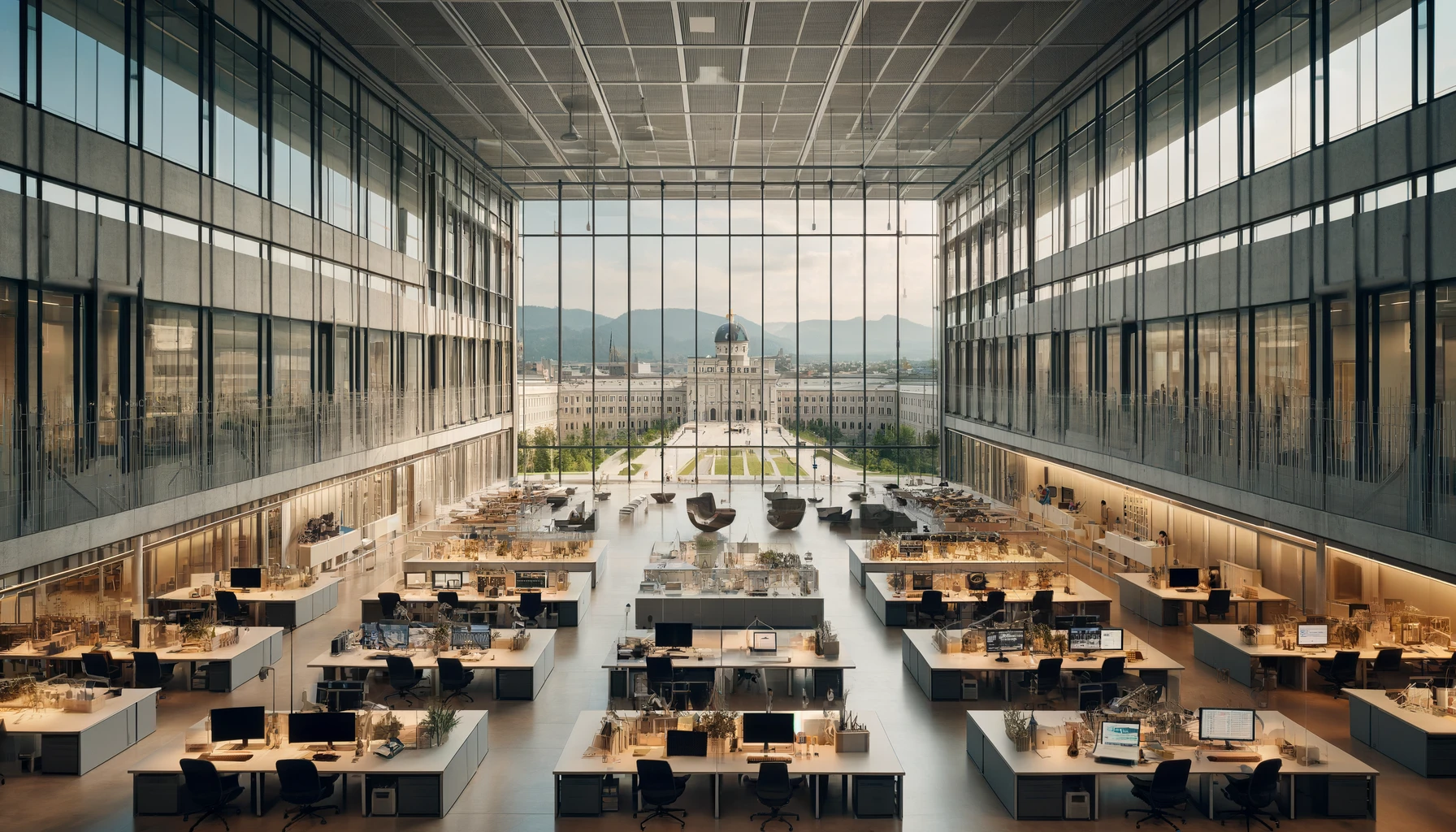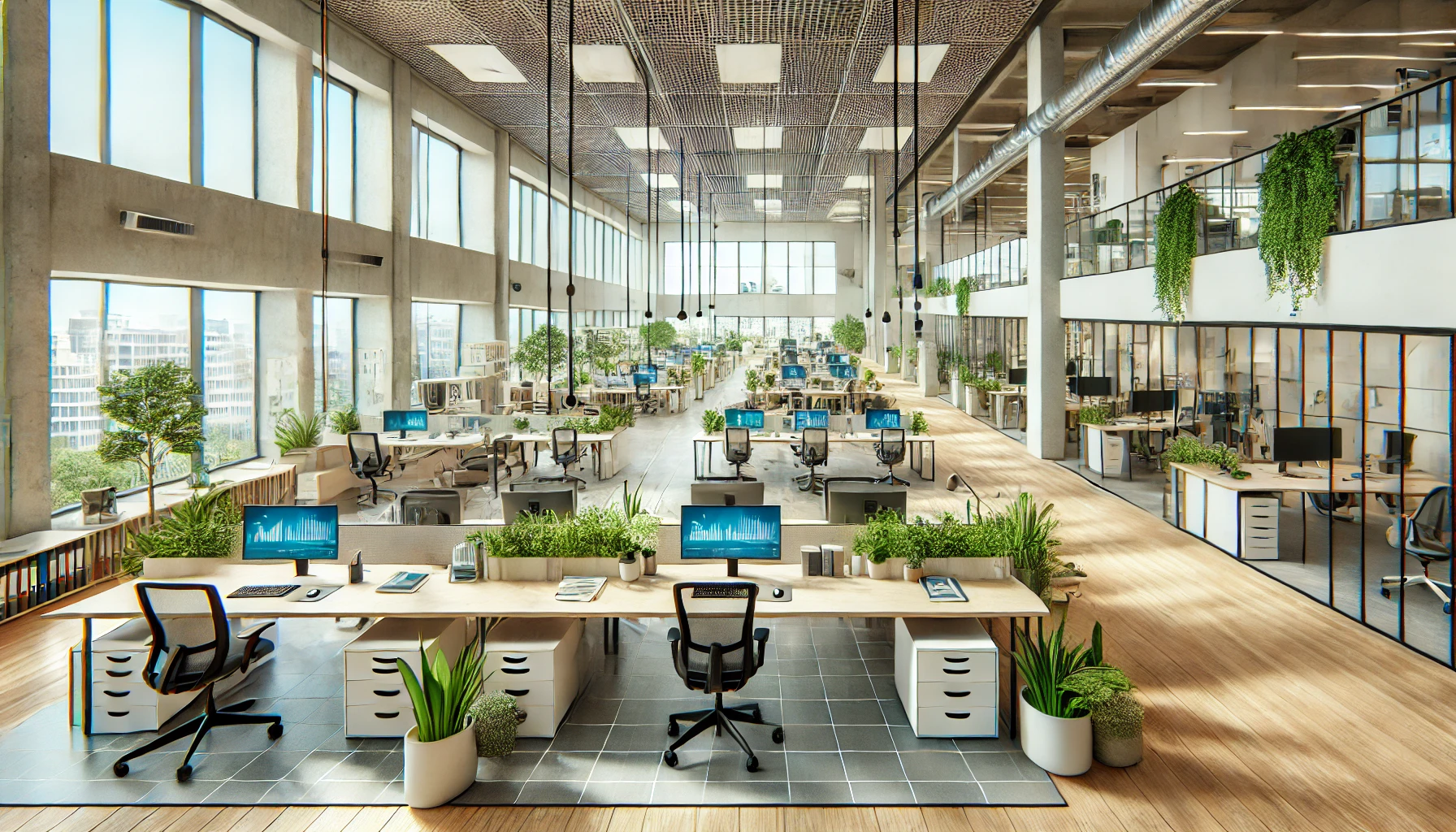Desk sharing in administration: A utopia?

Tumult in Austria: A new state service center is being built on around 10,000 square meters in Salzburg’s Bahnhofsviertel district, which focuses primarily on open workspaces and shared desks – but not without resistance. The workforce is extremely critical of the new space concept and emphasizes the need for individual offices. How can an agreement be reached?
A timber hybrid building based on New Work attracts criticism
A whole 13 floors of wood and concrete for over 1,200 employees: Salzburg has big plans for the new State Service Center (Landesdienstleistungszentrum, LDZ). The current construction project is set to become Austria’s most modern administration building, setting an example for sustainability and new ways of working – the plan is to equip the façade with around 4,500 photovoltaic panels and replace half of the traditional individual office with open desk-sharing areas. Construction work is scheduled to be completed in 2026.
A forward-looking idea in principle – but according to Bernd Gollackner, Chairman of the Central Committee of Staff Representatives, the planned room layout of the State Service Center is not tailored to the needs of the workforce, as he explains in an interview with SALZBURG24: The daily tasks in the administrative apparatus require concentrated quiet work – and walls, doors and noise-protected workstations are a necessity. To this end, work at the LDZ is tied to fixed group structures that require separate rooms with fixed workstations, as Gollackner explains: “We are ten departments, each with several units. Colleagues from the same specialist area want to sit together so that they can talk to each other.”
The clear position of the staff representatives: An office must adapt to the way employees work – and not the other way around. A good assessment of the question of which room types support the employees’ tasks could be made by the direct superiors of the college. However, the decision-making power lies with a project team which, according to the staff representatives, does not take sufficient account of the space-related interests of the employees.
A radical change without clear communication
It was not only the new area organization that offended LDZ employees: Misunderstandings are also said to have arisen in the communication of relevant information. As an example, Gollackner cites the concerns expressed about the noise level in open workspaces: “We were told that the noise level would be limited because the offices would never be completely full due to vacations, sick leave and time off. Then, shortly before Christmas, we were told that vacancies in other buildings would be reduced.”
An attempt in March to discuss the problem with the leading project team and regional office director Sebastian Huber also failed: The relevant contact persons were not present at the office meeting, and a list of questions that was subsequently formulated and submitted remained largely unanswered.
Internal communication is also taking a back seat: As things stand, the desk sharing model in the Salzburg administration building is not combined with workplace booking – a loss of transparent organization. Staff representatives are concerned about whether the shared desks will be sufficient for everyone or, for example, whether there will be no workstations left if field service appointments are canceled at short notice.
Supporting restructuring with technical solutions
The concerns of Bernd Gollackner and his colleagues are justified: Spatial adjustments to working environments require a clear exchange between everyone involved. At the same time, data-supported findings are indispensable. This is the only way to create a communicative basis that makes the office change comprehensible. Data could also be used to show exactly which forms of work determine everyday life in the administration and which spaces are necessary for this.
Technical tools such as algorithm-based area planning and workplace booking from ReCoTech are a direct route to greater transparency. Both solutions can be used to generate data on space utilization and usage. This facilitates decision-making when planning new office concepts. In addition, booking via app makes it possible to keep track of occupied or free workstations. Additional functions such as the integration of smart office sensors, which regulate the noise level in open workspaces with the help of white noise, tailor the technology to the needs of a wide variety of offices.
These articles might also interest you

New Partnership with the City of Böblingen: A Step Towards the Future
We are excited to announce the official partnership between ReCoTech and the City of Böblingen! This collaboration marks a significant ...

GEFMA 130-1 Sets New Standards for Sustainable and Efficient Space Utilization in Real Estate
Space management is a crucial aspect of real estate operations. It encompasses all activities related to the planning, use, and ...
New customer for ReCoTech: Welcome to STADT UND LAND
We are delighted to announce that ReCoTech has gained another significant client: STADT UND LAND Wohnbauten-Gesellschaft mbH. Our innovative workspace ...

